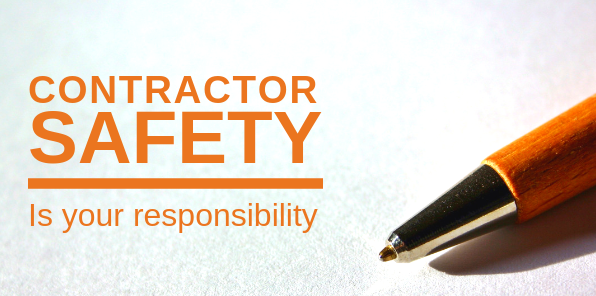Health and Safety Myths – #10 Contractor Management – The Thin Paper Wall
Whether you send out your own routine contractor management documents, or pay for a third party to assess your contractors’ credentials, it’s probably less than 10% of the job done. Because contractor management has always required a lot more than ticking boxes. Equally, having a safety manual doesn’t cut the mustard all by itself. So when there’s a Worksafe investigation after an injury, good intentions, policies and bits of paper are worthless. Pre-quals count for nothing if an employer fails to do what’s reasonably practicable at the coal face. There are many more effective duties required under the Act. (We will come to those below).
What does “pre-qual” contribute to contractor management?
We may well have a piece of paper that says a contractor was trained and is competent to do a job. But we are in the driving seat at our own workplaces. Even when we pay contractors to do remote or mobile work and they are away from our direct sight. So we can, and we should, exercise a level of influence and control. There are scores of things, apart from paper assurances about competencies and compliance. From site rules to safe work method statements to spot checking or meetings.
 Yes, it’s nice to get pre-qualification on our contractors, especially in writing, but it’s not a magic wand. Because it’s passive, not active. We pay for all this to be prepared, yet it may give us little or no protection if the poo hits the fan. It’s just a small part of the picture.
Yes, it’s nice to get pre-qualification on our contractors, especially in writing, but it’s not a magic wand. Because it’s passive, not active. We pay for all this to be prepared, yet it may give us little or no protection if the poo hits the fan. It’s just a small part of the picture.
Surely all that paper counts for something?
Sure. “Something”. But even the third party providers who offer to create pre-quals for us are careful not to make too many specific claims as to the benefits. Here’s what one provider says: They say the pre-qual will provide you with “an indication of a contractors’ ability to perform work safely”. That’s a deliberately cautious statement. But read it quickly and you may not notice the implied disclaimer.
Perhaps less convincingly, the advertising materials also describe pre-qualification as “contractor management”. That they give you “genuine peace of mind”. Well, it’s not contractor management as such. It’s perhaps a way to demonstrate that you select or screen contractors, so it’s an administrative step rather than active management. But you still have all the work ahead of you before you can achieve “genuine peace of mind”. (If there is, indeed, any such thing in managing safety).
So what duties does the Act require in terms of contractor management?
Well, first, to get the context straight, we need to briefly revisit that word “worker”. The Health and Safety at Work Act 2015, Section 19 “Meaning of worker”, paraphrased, says:
- a worker is an individual who works in any capacity for a PCBU (a business), including
- as a contractor
- sub-contractor
- employee of a contractor
- employee of a labour hire company
- outworker doing work for the PCBU
- volunteer
In summary: The term “workers” includes all your employees, work experience students, volunteers, and contractors of all types.
And the duties?
- HASAW Act Section 36 Primary duty of care: The PCBU must ensure as far as is reasonably practicable: that workers are provided with safe:
 work environment
work environment- plant and structures
- systems of work
- use, handling and storage of plant, substances and structures
- facilities for welfare, information, training and supervision and monitoring of health.
Comment: Broad-brush stuff, but this is what will most likely be used to take out a prosecution after something bad happens. Aha, I hear you say, “The contractor’s business is a PCBU too. So they are the entity who would be prosecuted”. And you would be right. But the problem comes when you, the principal, knew a contractor was working unsafely but did nothing about it.
This fact was illustrated all too clearly as far back as 1996, under the previous Health & Safety in Employment Act, in Department of Labour v Central Cranes. It’s a story most of us know but just briefly: A rigging company, whose employee was not wearing a harness or hard hat 40 metres up on a tower crane, was prosecuted. So was Central Cranes, who were employing the rigging company as a sub-contractor. The case against Central Cranes went all the way to the Court of Appeal and there, the prosecution was upheld. Under the current Health and Safety at Work Act, the case would probably have been more clear-cut. In other words, the only change has been that it’s a lot clearer now.
Isn’t that why we employ contractors though? They should know their own work!
So if we know about, or ought to have known about an unsafe situation with a contractor we employ, we have a duty to act. We can’t fold our arms, point at a pre-qualification document and claim we have “done our best”. We would not be expected to, (say) micro-manage an electrician and know if they were connecting the wrong wire. But if they were working unsafely off a wonky ladder, any “reasonable person” would know this to be unacceptable and we would have a duty.
Just to add to the above, here’s more from the HASAW Act:
 Duties not transferable, Section 31:A duty under the Act may not be transferred to another person.
Duties not transferable, Section 31:A duty under the Act may not be transferred to another person.- No contracting out, Section 28: Any contract that attempts to exclude, limit or modify the operation of the Act has no effect and is not a legal contract. (So even if a contractor has signed our generic agreement that includes “comply with the Health and Safety at Work Act”, we are not released from our duties).
- Person may have more than 1 duty, Section 32: A person may have more than one duty if they belong to more than one class of duty holder.
- More than one person may have the same duty, Section 33: Each duty holder must comply with that duty, even if another duty holder has the same duty. Each person retains responsibility for their duty and must discharge their duty to the extent to which they have the ability to influence and control the matter.
- PCBU must consult other PCBUs with same duty, Section 34: Must consult, co-operate with, and co-ordinate activities.
Summary: We are locked into our duties. And we may have a number of duties that other parties also have. The fact that other parties share the same duties does not let us off the hook, in fact, we have to actively co-operate with those parties.
More duties to workers
The above are key duties but I’ll just throw in some more where the duties are to “workers”:
- HASAW Act Section 28: Duty to engage with workers;
- HASAW Act Section 59: Nature of engagement.
- Health and Safety at Work General Risk and Workplace Management Regulations 2016: Regulation 9: Duty to provide information, supervision, training and supervision (to workers).
- Health and Safety at Work General Risk and Workplace Management Regulations 2016: Regulation 17: Other duties of PCBU to provide PPE (to workers).
What about duties of workers themselves?
- HASAW Act Section 45: Duties of workers:
- to take reasonable care of their own safety
- that any acts or omissions do not harm others
- to comply, as far as able with the PCBU’s reasonable instructions, policies and procedures.
Comment: This is short but very broad. And it’s helpful if used the right way. Because a worker, any worker, has a duty to look after themselves and all others in the workplace. Including as a result of anything they do or fail to do. And they must follow any reasonable instruction or safety precaution.
Summarising contractor management
It is true that the immediate employer has the overriding duty to a worker in a workplace. But it is clear from the above that a principal cannot stand to one side. And failure to carry out the above duties may well lead to a prosecution of more than one party, even for the same offence. Particularly where it was reasonably practicable to take action and where any reasonable person would have known about the unsafe situation.
So a principal has a duty to actively monitor and manage day-to-day risks with contractors. Therefore, what value would you put on pre-qualifications? It’s a bit like getting a pre-purchase check on a vehicle that only looks at the WOF and Rego stickers. A snapshot. And that’s why I call it “The Thin Paper Wall”. It’s fine, but please don’t imagine that it protects you all that much from your liabilities.
Contact me if I can help you with any safety stuff. Call 0800 000 267 for a welcoming chat, or email simon@safetypro.co.nz
- Simon Lawrence is Director of SafetyPro Limited.
- Consulting for safety: Safety Advice, Problem Solving, Audits and Training
- Call 0800 000 267 for a welcoming chat, or email simon@safetypro.co.nz
My 10 Health & Safety Myths. Planned topics and dates.
-
- # 1: Passion for Safety – Please no! 29 August 2019
- #2 Lost Time Injury Rates – Dark Arts in the Boardroom. 18 September 2019
- #3 Zero Harm – Stop Taking it Literally! 9 October 2019
- #4 We Have a Safety Culture – Yeah. Nah! 30 October 2019
- #5 Safety Audits – Smoke and Mirrors 20 November 2019
- #6 Safety Manuals – You’d Think it Would be Simple 31 January 2019
- #7 Safety Policy Statements – You Are Committed to What? 21 February 2020
- #8 The Hazard Register – What Is It Really For? 7 August 2020
- #9 Accident Investigation – Tick & Flick 28 August 2020
- #10 Contractor Management – The Thin Paper Wall 18 September 2020
Check out our SafetyBase software
- View a 4 minute video overview. Please like or share.
- Browse the SafetyBase website.
- Short cut to the all-important Pricing Page. No hidden costs.
- Download a PDF Fact Sheet to show to your Senior Leadership Team.
Call me, Simon, on 0800 000 267 or email simon@safetypro.co.nz You could be trying out this highly effective health and safety software system in minutes

